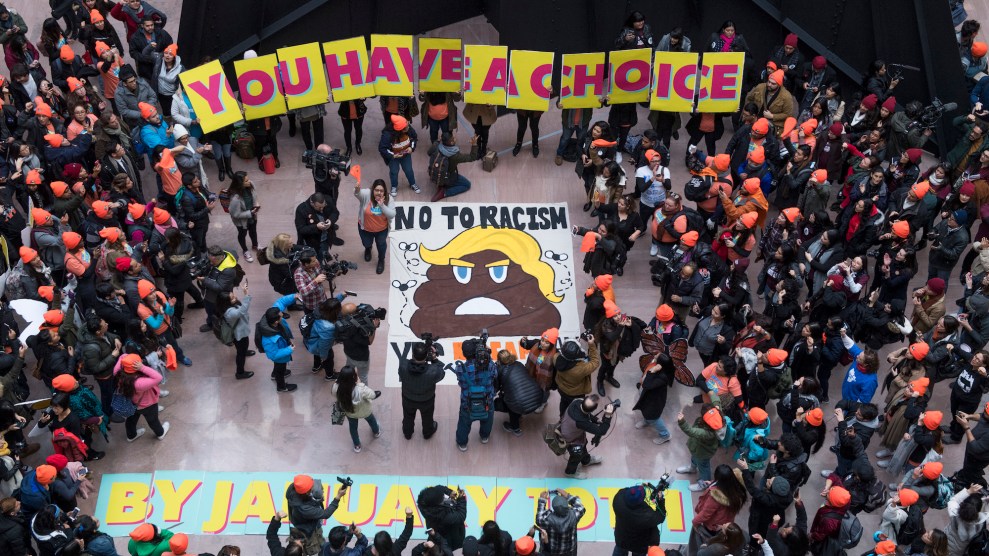
Demonstrators with United We Dream and others rally in the Hart Senate Office Building on Tuesday to call on Congress to protect DACA recipients.Tom Williams/AP
As the Senate debates whether to shut down the government, the nearly 700,000 Dreamers—undocumented immigrants who came to the United States as children—are hoping this time will be different. Last year, moderate Democratic senators voted twice to fund the government without restoring Dreamers’ protections from deportation. Today, they’ll decide whether to do so again.
At least nine Democrats who voted to keep the government running in December have said they will not do so this time. That likely leaves Majority Leader Mitch McConnell (R-Ky.) short of the 60 votes he needs to join the House in passing a stopgap measure to fund the government until mid-February. McConnell will have two options if Democrats and some Republicans remain opposed: let the government shut down or add protections for Dreamers.
The current impasse was prompted by President Donald Trump’s decision in September to end Deferred Action for Childhood Arrivals (DACA), a 2012 executive action by President Barack Obama that provided work permits to undocumented immigrants who arrived as children and spared them from deportation. A federal judge in California blocked parts of the Trump administration’s termination of DACA last week, temporarily allowing Dreamers to apply for renewal of their status. The Justice Department has appealed that decision to the Supreme Court. If the Justice Department wins its appeal and Congress does not act, the number of people losing DACA each day could rise from more than 100 currently to nearly 1,000 after March 5, the renewal deadline set by the administration.
In September, just days after Trump ended DACA, Congress overwhelmingly approved a short-term funding bill that included disaster relief for victims of Hurricane Harvey. United We Dream criticized Democrats for not insisting on protections for Dreamers, saying, “Democratic leaders tell immigrants that relief from deportation would come someday down the road—and that someday never comes.” In late December, moderate Democrats voted again to keep the government open without addressing DACA.
Now Republicans are trying to win over enough Democrats by including a six-year extension of the Children’s Health Insurance Program (CHIP) in their funding bill. Despite bipartisan support, Republicans missed a September deadline to renew the program.
Adrian Reyna, a DACA recipient and a spokesman for the youth-led advocacy organization United We Dream, says his group is asking Democrats to vote no on Friday. He argues that keeping the government running without addressing DACA means “actively choosing to uphold the ‘shithole’ doctrine that Donald Trump has laid out for this country.” Lorella Praeli, the ACLU’s director of immigration policy and a former undocumented immigrant, says ignoring DACA “means that you’re voting to deport Dreamers.”
Last week, a bipartisan group of senators led by Dick Durbin (D-Ill.) and Lindsey Graham (R-S.C.) appeared close to striking a deal that would provide a path to citizenship for Dreamers while increasing funding for border security. That fell apart after White House Chief of Staff John Kelly and domestic policy adviser Stephen Miller reportedly pushed Trump to oppose it.
Republicans say they’ll be able to quickly negotiate a bipartisan immigration deal if the government stays open. Praeli doesn’t buy it. “We’ve been through this plenty before,” she says. “Their strategy is to delay to derail.” Reyna says United We Dream is less likely to support a broader immigration bill that comes out of a drawn-out negotiation.
Zuleima Dominguez, a student at Hunter College in New York with DACA status, says her life has been turned “upside down” in recent months. She recently left a job at Target to go back to working at a homeless shelter, where the boss won’t mind if she loses her work permit. Dominguez had stopped working at the shelter after witnessing domestic abuse and taking care of a woman who was overdosing. She still hates the job.
For Dominguez, the delays make it feel like Washington is “just playing with us.” Reyna says the ups and downs—a judge blocks DACA, the Justice Department appeals; Trump says he’ll sign a bill protecting Dreamers, then changes his mind—take their toll. “You know that visual of when Charlie Brown is going to kick the football and then Lucy lets it go?” Reyna asks. That’s the feeling Dreamers have had since September, he says: “They keep us luring into something and then, whoop, never mind.”












